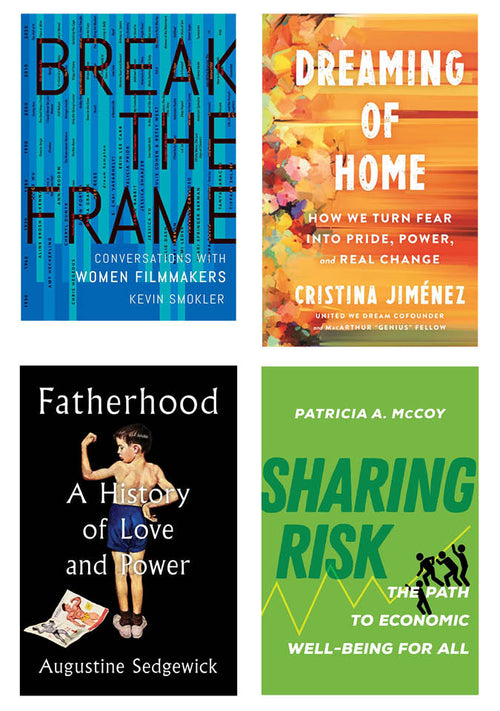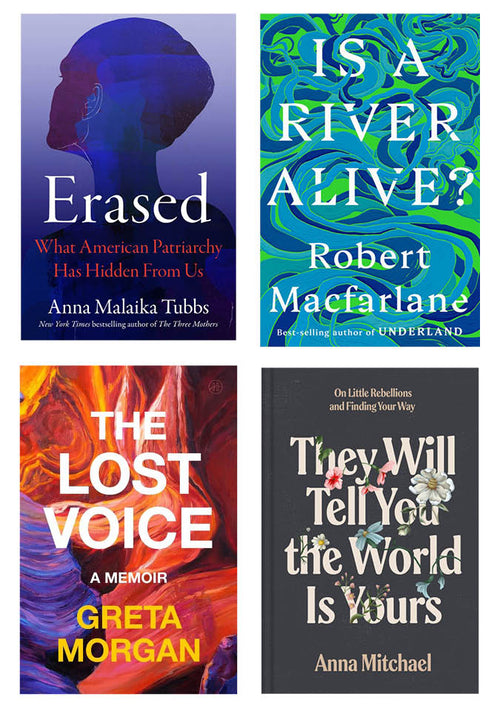New Book Releases for the Week of October 29, 2024
Featuring new book releases from Karthik Ramanna, Lyta Gold, Serene Khader, and Glory Edim.
Finding the right book at the right time can transform your life or your organization. As expert booksellers, we help you discover your next great read by showcasing four recently released titles each week.
The books are chosen by Porchlight's Managing Director, Sally Haldorson, and the marketing team: Dylan Schleicher, Gabbi Cisneros, and Jasmine Gonzalez.
(Book descriptions are provided by the publisher unless otherwise noted.)
Our Recommended Books This Week

Dylan’s pick: The Age of Outrage: How to Lead in a Polarized World by Karthik Ramanna, published by Harvard Business Review Press
Outrage is everywhere—on the left and on the right—and many companies have found themselves in the crosshairs. GoFundMe was pressured to cut off funding to protesting truckers in Ottawa. Disney's CEO was dragged down for mishandling both sides of Florida's "Don't Say Gay" law. Facebook and other tech companies have been accused of manipulating elections in many countries and by many parties.
People are angry with the world—in some cases, rightfully so—and now view companies as they do governments, as targets of their wrath and potential forces for social change. Managing outrage has moved from being an occasional leadership challenge, like handling a PR crisis, to a necessary and critical leadership capability, like strategic thinking or financial acumen.
Based on his popular University of Oxford leadership course and case studies on organizations such as IKEA, Nestlé, the Vatican, and others, Karthik Ramanna offers practical steps to make sense of the outrage, work with relevant stakeholders to progress through it, and emerge stronger for it. Ramanna's pragmatic framework, developed through years of experience with organizations, helps leaders "turn down the temperature," analyze root causes, develop and implement responses that are mission-consistent, and build resilience.
The Age of Outrage is an essential guide for leaders and their teams in this new era of polarization.
Gabbi’s pick: Dangerous Fictions: The Fear of Fantasy and the Invention of Reality by Lyta Gold, published by Soft Skull
Fictional stories have long held an uncanny power over hearts and minds, especially those of young people. In Dangerous Fictions, Lyta Gold traces arguments both historical and contemporary that have labeled fiction as dark, immoral, frightening, or poisonous. Within each she asks: How “dangerous” is fiction, really? And what about it provokes waves of moral panic and even censorship?
Gold argues that any panic about art is largely a disguised panic about power. There have been versions of these same fights over fiction for centuries. By exposing fiction as a social danger and a battleground of immediate public concern, we can see what each side really wants—the right to shape the future of a world deeply in flux and a distraction from more pressing material concerns about money, access, and the hard work of politics.
From novels about people driven insane by reading novels to “copaganda” TV shows that influence how viewers regard the police, Gold uses her signature wit, research, and fearless commentary to point readers toward a more substantial question: Fiction may be dangerous to us, but aren’t we also dangerous to it?
Jasmine’s pick: Faux Feminism: Why We Fall for White Feminism and How We Can Stop by Serene Khader, published by Beacon Press
After over 175 years, the feminist movement, now in its fourth wave, is at risk of collapsing on its eroding foundation. In Faux Feminism, political philosopher Serene Khader advocates for another feminism—one that doesn’t overwhelmingly serve white, affluent #girlbosses. With empathy, passion, and wit, Khader invites the reader to join her as she excavates the movement’s history and draws a blueprint for a more inclusive and resilient future.
A feminist myth buster, Khader begins by deconstructing “faux feminisms.” Thought to be the pillars of good feminism, they may appeal to many but, in truth, leave most women behind. Khader identifies these traps that white feminism lays for us all, asking readers to think critically about
- The Freedom Myth: The overarching misconception that feminism is about personal freedom rather than collective equality
- The Individualism Myth: The pervasive idea that feminism aims to free individual women from social expectations
- The Culture Myth: The harmful misconception that “other” cultures restrict women’s liberation
- The Restriction Myth: The flawed belief that feminism is a fight against social restrictions
- The Judgment Myth: The fallacy of celebrating women’s choices without first interrogating the privileges afforded or denied to the women
In later chapters, Khader draws on global and intersectional feminist lessons of the past and present to imagine feminism’s future. She pays particular attention to women of color, especially those in the Global South. Khader recounts their cultural and political stories of building a more inclusive framework in their societies. These are the women, she argues, from whom today’s feminists can learn.
Khader’s critical inquiry begets a new vision of feminism: one that tackles inequality at the societal, not individual, level and is ultimately rooted in community.
Sally’s pick: Gather Me: A Memoir in Praise of the Books That Saved Me by Glory Edim, published by Ballantine Books
“She is a friend of my mind. She gather me, man. The pieces I am, she gather them and give them back to me in all the right order.”—Toni Morrison
For Glory Edim, that "friend of my mind" is books. Edim, who grew up in Virginia to Nigerian immigrant parents, started the popular Well-Read Black Girl book club at age thirty eventually reaching a community of half a million other readers. But her love of books stretches far back.
When Edim's father moved back to Nigeria while she was still a child, she and her brothers were left with a single mother and little money, often finding a safe space at their local library. Books were where Edim found community, and as she grew older, she discovered authors and ideas she wasn't being taught in class. In dorm rooms and airplanes and on subway rides, she found the Black writers whose words would forever change her life: Nikki Giovanni through children's poetry cassettes; Maya Angelou through a critical high school English teacher; Toni Morrison while attending Morrison's alma mater, Howard University; Audre Lorde on a flight to Nigeria. In prose full of both joy and heartbreak, Edim recounts how these writers and so many others helped her to value herself: to find her own voice when her mother lost hers, to trust her feelings when her father remarried, to create bonds with other Black women and uplift their stories.
Gather Me is a glowing testament to the power of representation and the lasting impact of literature to gather our disparate parts and put them back together.
Buy these recommended new book releases and more directly from Porchlight Book Company.
Are you interested in buying multiple copies of the same book? We offer bulk discounts and flexible shipping, ideal for book clubs, employee resource groups, and other reading communities. Browse our product catalog or contact our customer service team to request a quote. Happy reading!




